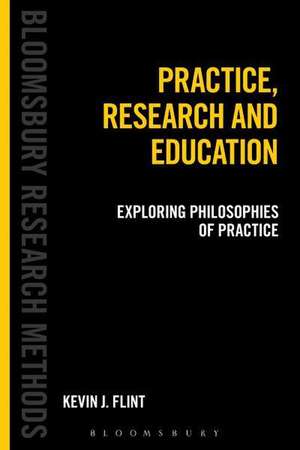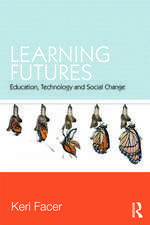Rethinking Practice, Research and Education: A Philosophical Inquiry
Autor Dr Kevin J. Flinten Limba Engleză Hardback – 25 feb 2015
Preț: 1009.65 lei
Preț vechi: 1293.10 lei
-22% Nou
Puncte Express: 1514
Preț estimativ în valută:
193.21€ • 201.97$ • 163.27£
193.21€ • 201.97$ • 163.27£
Carte tipărită la comandă
Livrare economică 06-20 martie
Preluare comenzi: 021 569.72.76
Specificații
ISBN-13: 9781441145260
ISBN-10: 1441145265
Pagini: 336
Dimensiuni: 156 x 234 x 23 mm
Greutate: 0.64 kg
Editura: Bloomsbury Publishing
Colecția Bloomsbury Academic
Locul publicării:London, United Kingdom
ISBN-10: 1441145265
Pagini: 336
Dimensiuni: 156 x 234 x 23 mm
Greutate: 0.64 kg
Editura: Bloomsbury Publishing
Colecția Bloomsbury Academic
Locul publicării:London, United Kingdom
Caracteristici
Explores new ways of talking about research for the researching professional
Notă biografică
Kevin J. Flint is Reader in Education at Nottingham Trent University, UK.
Cuprins
AcknowledgementsIntroductionPrologue: Rationale for the Approach Adopted in This StudyPart I: Practice of Social and Educational Research1. The Pragmatics of Practice in Research: What Is so Easily Missed?2. Existential Dramas in Researching Practice: What Is Their Significance?3. Power, Politics, and Rationalities of Researching Practice: What Can Be Learned from Foucault and Agamben?Part II: Laws and Justice to Come in Practice4. Reframing the Ethics of Research: Laws and Justice to Come5. Re-framing the Ethics of Research: Laws and Justice in the Practice of ResearchPart III: Method/ologies in Practice6. Transformations-in Research: Moving Beyond Disciplinary Regimes7. Transformations-in Research Methodologies: Moving Beyond Enframing8. Transformations-in Methods: Opening Space for Beings9. Transformations-in the Analytics of Research: Generating Spacing for ThinkingPart IV: The Politics of Practice10. The Politics of Evidence: Challenging Forces 'Delimiting Education' in This Liquid Modern World'11. The Politics of practice: Challenging Spacing for Play in Delimiting Forms of Education12. The Politics of identity: Moving towards Justice in the Event of ResearchNotesBibliographyIndex
Recenzii
Drawing on European philosophy, Flint deconstructs current understandings around research in a controversial and provocative way and, in so doing, opens new avenues for debates concerned with the relationship between research and education.
I seriously hope this book will make a dent in the bland confidence of the research formula industry. It's a large task but it makes a bracing beginning.
This book represents a bold and closely argued challenge to everyone involved in qualitative research, but especially to those conducting research in the areas of professional and public services.
This excellent book successfully fills a significant gap in the existing literature on qualitative research, addressing major issues from a philosophical and theoretical perspective.
Dazzling in the amount of common assumptions it asks us to put into question, this book is recommended reading for anyone interested in research who feels that we are missing something, that current research is suffering from a crucial blind spot, and who seeks a language to articulate this.
In this book, Flint lucidly and cogently constructs a scholarly deconstruction of contemporary practitioner research, positing a rigorous, visceral alternative which embodies a challenge to leadership and scholarship within the field. This is no ivory tower; it is a bold attempt to place deep thinking at the heart of the critically-reflective lived experience and in so doing create an astute, thoughtful understanding of the relationship between practice, research and education. Each chapter is written with a sensitivity for words that makes the cerebral engagement an exhausting delight. It is an elegant text which 'gives expression to those many, silent vitalizing forces at work in our everyday practices'.
This startling new work presents us with a fresh perspective on what we have come to call 'practice-based research'. The reader is invited to relinquish some of the mistakes, missed possibilities and language that is currently used. Instead we look through a lens of social justice. Fluent and well written by an expert in the field, the book offers new material, issues and challenges with a philosophical perspective on practice, research and education, revealing the inequalities of systems and taken-for-granted procedures and methods in this thought provoking, critical evaluation.
I seriously hope this book will make a dent in the bland confidence of the research formula industry. It's a large task but it makes a bracing beginning.
This book represents a bold and closely argued challenge to everyone involved in qualitative research, but especially to those conducting research in the areas of professional and public services.
This excellent book successfully fills a significant gap in the existing literature on qualitative research, addressing major issues from a philosophical and theoretical perspective.
Dazzling in the amount of common assumptions it asks us to put into question, this book is recommended reading for anyone interested in research who feels that we are missing something, that current research is suffering from a crucial blind spot, and who seeks a language to articulate this.
In this book, Flint lucidly and cogently constructs a scholarly deconstruction of contemporary practitioner research, positing a rigorous, visceral alternative which embodies a challenge to leadership and scholarship within the field. This is no ivory tower; it is a bold attempt to place deep thinking at the heart of the critically-reflective lived experience and in so doing create an astute, thoughtful understanding of the relationship between practice, research and education. Each chapter is written with a sensitivity for words that makes the cerebral engagement an exhausting delight. It is an elegant text which 'gives expression to those many, silent vitalizing forces at work in our everyday practices'.
This startling new work presents us with a fresh perspective on what we have come to call 'practice-based research'. The reader is invited to relinquish some of the mistakes, missed possibilities and language that is currently used. Instead we look through a lens of social justice. Fluent and well written by an expert in the field, the book offers new material, issues and challenges with a philosophical perspective on practice, research and education, revealing the inequalities of systems and taken-for-granted procedures and methods in this thought provoking, critical evaluation.












